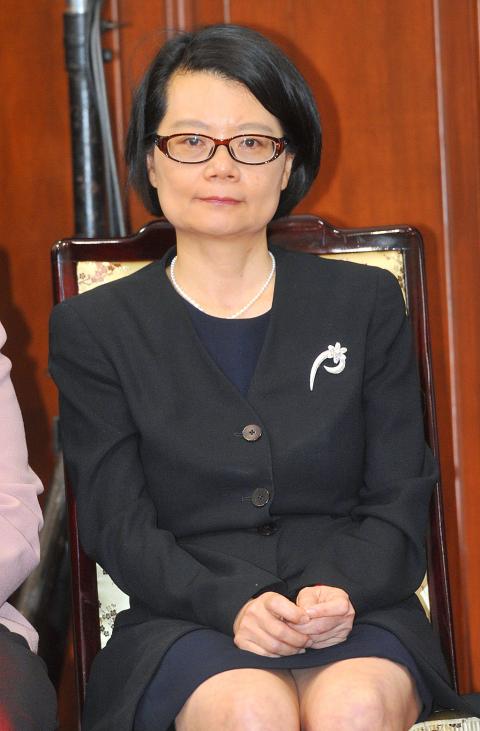Wang Mei-yu (王美玉), president of Chinese-language newspaper the China Times, was appointed to a six-year term as a Control Yuan member yesterday, the first acting media professional to be tapped for the job.
The Presidential Office yesterday unveiled its list of 29 members of the fifth-term Control Yuan. It was the second time President Ma Ying-jeou (馬英九) has made the appointments during his presidency.
Wang was the third veteran journalist appointed to the position, following Huang Chao-heng (黃肇珩), who was general manager of Cheng Chung Book Co when nominated in 1993, and incumbent Control Yuan member Wu Feng-shan (吳豐山), who was previously a minister without portfolio.

Photo: Liu Hsin-de, Taipei Times
“My 32-year career in journalism came to an end today,” Wang said.
Wang said she accepted the nomination and immediately resigned as president of the China Times, part of the Want Want China Times Group (旺旺中時集團) owned by Tsai Eng-meng (蔡衍明).
Democratic Progressive Party Legislator Huang Wei-cher (黃偉哲) yesterday questioned Wang’s qualifications for the position.
“A member of the Control Yuan must be above partisanship and apolitical, but Wang has long worked with a media outlet that holds strong political views,” he said.
Among the 29 nominees, including Election Commission Chairperson Chang Po-ya (張博雅) being appointed president of the Control Yuan and former Council of Indigenous Peoples minister Sun Ta-chuan (孫大川) being nominated as vice president, only seven were incumbent members.
Liao Pen-chuan (廖本全), an associate professor at National Taipei University’s Department of Real Estate and Built Environment, was disappointed with the appointment of Shih Hung-chih (施鴻志), a retired professor of urban planning, because of Shih’s record handling controversial land expropriations.
Shih had demanded that reporters be excluded from a review of the Taoyuan Aerotropolis, one of the government’s flagship urban renewal projects that covers more than 3,000 hectares of land and affects more than 7,000 households, last year when he chaired a meeting as a member of the Ministry of the Interior’s urban planning commission.
The reason Shih then cited for the ejection order was that public interest was not a factor being considered by the commission.
As a professional expert whom the government has long consulted with on urban renewal and planning issues over the years, Shih has overlooked the importance of public participation in the decisionmaking process, Liao said.
The way he handled the review of the Taoyuan Aerotropolis project showed Shih disregarded the values of democracy, human rights, justice and sustainability, which are all vital to ensure that such projects are in the best interests of the public, Liao said.
With the departure of Control Yuan members Ma Yi-kung (馬以工), Liu Yuh-san (劉玉山) and Huang Huang-hsiung (黃煌雄), who have identified several major flaws in land expropriation cases over the years, and the appointment of Shih, the only candidate among the 29 with a background in urban planning, people facing eviction from their homes as urban renewal efforts mushroom could be left helpless when they turn to the Control Yuan for help, Liao said.

SECURITY: As China is ‘reshaping’ Hong Kong’s population, Taiwan must raise the eligibility threshold for applications from Hong Kongers, Chiu Chui-cheng said When Hong Kong and Macau citizens apply for residency in Taiwan, it would be under a new category that includes a “national security observation period,” Mainland Affairs Council (MAC) Minister Chiu Chui-cheng (邱垂正) said yesterday. President William Lai (賴清德) on March 13 announced 17 strategies to counter China’s aggression toward Taiwan, including incorporating national security considerations into the review process for residency applications from Hong Kong and Macau citizens. The situation in Hong Kong is constantly changing, Chiu said to media yesterday on the sidelines of the Taipei Technology Run hosted by the Taipei Neihu Technology Park Development Association. With

CARROT AND STICK: While unrelenting in its military threats, China attracted nearly 40,000 Taiwanese to over 400 business events last year Nearly 40,000 Taiwanese last year joined industry events in China, such as conferences and trade fairs, supported by the Chinese government, a study showed yesterday, as Beijing ramps up a charm offensive toward Taipei alongside military pressure. China has long taken a carrot-and-stick approach to Taiwan, threatening it with the prospect of military action while reaching out to those it believes are amenable to Beijing’s point of view. Taiwanese security officials are wary of what they see as Beijing’s influence campaigns to sway public opinion after Taipei and Beijing gradually resumed travel links halted by the COVID-19 pandemic, but the scale of

A US Marine Corps regiment equipped with Naval Strike Missiles (NSM) is set to participate in the upcoming Balikatan 25 exercise in the Luzon Strait, marking the system’s first-ever deployment in the Philippines. US and Philippine officials have separately confirmed that the Navy Marine Expeditionary Ship Interdiction System (NMESIS) — the mobile launch platform for the Naval Strike Missile — would take part in the joint exercise. The missiles are being deployed to “a strategic first island chain chokepoint” in the waters between Taiwan proper and the Philippines, US-based Naval News reported. “The Luzon Strait and Bashi Channel represent a critical access

Pope Francis is be laid to rest on Saturday after lying in state for three days in St Peter’s Basilica, where the faithful are expected to flock to pay their respects to history’s first Latin American pontiff. The cardinals met yesterday in the Vatican’s synod hall to chart the next steps before a conclave begins to choose Francis’ successor, as condolences poured in from around the world. According to current norms, the conclave must begin between May 5 and 10. The cardinals set the funeral for Saturday at 10am in St Peter’s Square, to be celebrated by the dean of the College